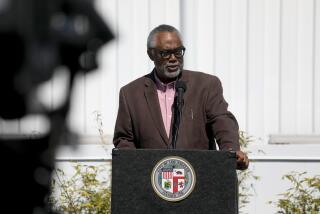Off to a Good Start
The new National AIDS Commission has made a propitious start on its work, demonstrating both the wisdom of Congress in creating the commission and the strength of its members, appointed by Congress and President Bush.
At its initial meeting, the commission moved quickly into the critical problem of drug abuse, expressing its disappointment at the failure of President Bush to address the AIDS problem in conjunction with his massive anti-drug campaign. That stand was important in several ways. It demonstrated the independence of the commission and its willingness, unanimously, to chide the President even though he appointed some of the members.
It also demonstrated a commitment to implement the recommendations of the Presidential Commission on the Human Immunodeficiency Virus (HIV) Epidemic, headed by Adm. James Watkins during the Reagan Administration. That commission had made on-demand drug treatment one of its highest priorities because the fastest growing HIV-infected population is comprised of intravenous drug users.
The new commission received encouragement on that very point on its first day of meeting from retiring Surgeon General C. Everett Koop. He lamented President Reagan’s failure to implement the constructive report of the Watkins-led commission. “What was needed was for the executive branch that appointed it to pick it up and run with it,” Koop said. “We need that desperately.”
Commission members also moved quickly to support congressional action increasing funds for AZT treatment of HIV-infected persons while at the same time urging Congress to resist amendments. That was a useful reminder that amendments in the past have been ideologically slanted to impose limitations and regulations strongly opposed by most public health officials but supported by those who appear more interested in castigating homosexual and drug-abusing victims of the disease than controlling the pandemic.
The commission head, Dr. June Osborn, dean of the School of Public Health at the University of Michigan, has set a remarkably constructive tone for commission work. Her major goal: “The development of a national consensus that liberates the compassion of the American people.” She added, in an interview: “There is still a widespread tendency to want to have people with AIDS fired or relocated so they don’t work next to you. All of that is coming from ignorance.”
The President has made statements that reflect that same commitment to compassion. The challenge may come, however, when the commission clarifies the priorities and the cost of addressing the problems, which multiply each day. But cannot be ignored without paying an even more exorbitant price.
More to Read
Sign up for Essential California
The most important California stories and recommendations in your inbox every morning.
You may occasionally receive promotional content from the Los Angeles Times.










